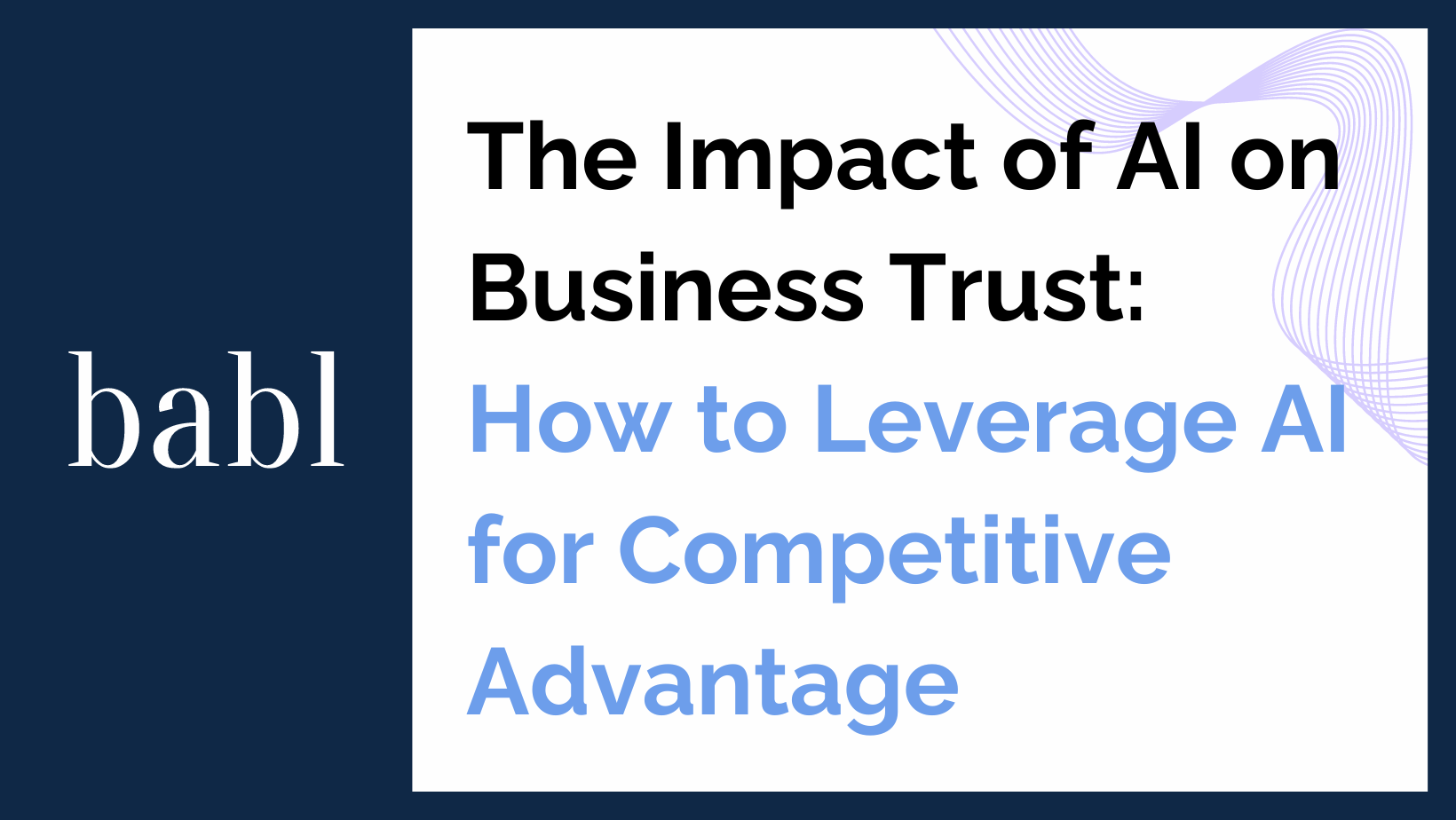In today’s fast-paced digital landscape, artificial intelligence (AI) is not just a technological advancement but a strategic tool that can significantly influence business success. As companies increasingly integrate AI into their operations, the role of trust becomes paramount. Trust in AI systems can enhance customer loyalty, improve employee engagement, and attract investors, providing a crucial competitive advantage. In this blog, we’ll explore how businesses can leverage AI responsibly to build trust with stakeholders, focusing on compliance, ethical AI use, and effective communication strategies.
The Role of AI in Modern Business
AI technologies are revolutionizing industries by automating processes, enhancing decision-making, and providing deeper insights through data analysis. From customer service chatbots to predictive analytics, AI offers numerous benefits that can streamline operations and create new business opportunities. However, the adoption of AI also raises concerns about privacy, bias, and ethical implications, which can impact trust among consumers, employees, and other stakeholders.
Building Trust Through Compliance
Compliance with regulations and industry standards is a fundamental aspect of building trust in AI. Regulatory frameworks, such as the General Data Protection Regulation (GDPR) in Europe and the EU AI Act, set clear guidelines on data protection, transparency, and accountability. Businesses that comply with these regulations demonstrate their commitment to responsible AI use, which can enhance their reputation and trustworthiness.
- Data Privacy and Security: Ensuring the privacy and security of data is crucial. Businesses must implement robust data protection measures and be transparent about how they collect, store, and use data. This transparency helps build trust with consumers who are increasingly concerned about their personal information’s safety.
- Transparent AI Practices: Transparency in AI practices involves clearly communicating how AI systems make decisions, especially in areas like automated hiring, credit scoring, or medical diagnostics. Providing understandable explanations helps demystify AI technologies and fosters trust by ensuring that stakeholders are informed and aware of the AI’s functioning.
- Regular Audits and Assessments: Conducting regular audits and assessments of AI systems ensures that they operate as intended and comply with ethical standards. These audits can identify biases, inaccuracies, or unfair outcomes, allowing businesses to address issues proactively.
Ethical AI Use: A Pillar of Trust
Ethical considerations are central to gaining and maintaining trust in AI. Businesses must commit to ethical AI practices that prioritize fairness, accountability, and transparency.
- Bias Mitigation: One of the most critical ethical concerns in AI is the potential for bias, which can lead to discriminatory outcomes. Companies should implement strategies to identify and mitigate biases in AI algorithms, ensuring that these systems treat all individuals fairly regardless of race, gender, or other characteristics.
- Accountability and Responsibility: Establishing clear lines of accountability for AI systems is essential. Businesses should designate responsible parties for the development, deployment, and monitoring of AI technologies. This accountability framework ensures that there are mechanisms in place to address any issues that arise and provides stakeholders with a point of contact for concerns.
- Ethical Guidelines and Training: Developing and adhering to ethical guidelines for AI use is crucial. Training employees on these guidelines ensures that they understand the ethical implications of AI and can act accordingly. This proactive approach to ethics not only builds internal trust but also demonstrates to external stakeholders that the company is serious about responsible AI use.
Effective Communication Strategies
Communication plays a vital role in building trust with stakeholders. Businesses must be transparent about their AI strategies, practices, and the measures they take to ensure ethical and responsible use.
- Stakeholder Engagement: Engaging with stakeholders, including customers, employees, investors, and regulators, is essential for building trust. Regular updates, open forums, and feedback mechanisms allow businesses to address concerns and demonstrate their commitment to transparency and accountability.
- Public Reporting and Disclosure: Publicly reporting on AI practices, including any challenges faced and steps taken to address them, enhances transparency. Companies can publish annual reports or sustainability reports that include sections on AI ethics, compliance, and trust-building initiatives.
- Educational Initiatives: Educating stakeholders about AI technologies and their implications helps demystify these systems and build trust. Businesses can organize workshops, webinars, or informational campaigns to explain how AI works, its benefits, and how they are managing potential risks.
Leveraging AI for Competitive Advantage
Businesses that successfully build trust in their AI systems can gain a significant competitive advantage. Trustworthy AI systems can:
- Enhance Customer Loyalty: Customers are more likely to remain loyal to brands they trust. By demonstrating a commitment to ethical AI practices, businesses can strengthen customer relationships and encourage repeat business.
- Attract and Retain Talent: Employees want to work for companies that align with their values, including ethical use of technology. Companies that prioritize responsible AI use can attract top talent and reduce turnover rates, as employees feel more secure and aligned with the company’s mission.
- Secure Investment and Partnerships: Investors and partners are increasingly considering ethical practices in their decision-making processes. Businesses that showcase their commitment to responsible AI use are more likely to attract investment and form beneficial partnerships.
Conclusion
As AI continues to shape the future of business, the importance of trust cannot be overstated. Businesses must prioritize compliance, ethical AI use, and transparent communication to build and maintain trust with all stakeholders. By doing so, they not only mitigate risks but also position themselves for long-term success in a competitive market. Leveraging AI responsibly is not just a moral imperative; it is a strategic advantage that can drive growth, innovation, and sustainable business practices.
Need Help?
If you want to have a competitive edge when it comes to AI regulations and laws, don’t hesitate to reach out to BABL AI. Hence, their team of Audit Experts can provide valuable insights on implementing AI.





